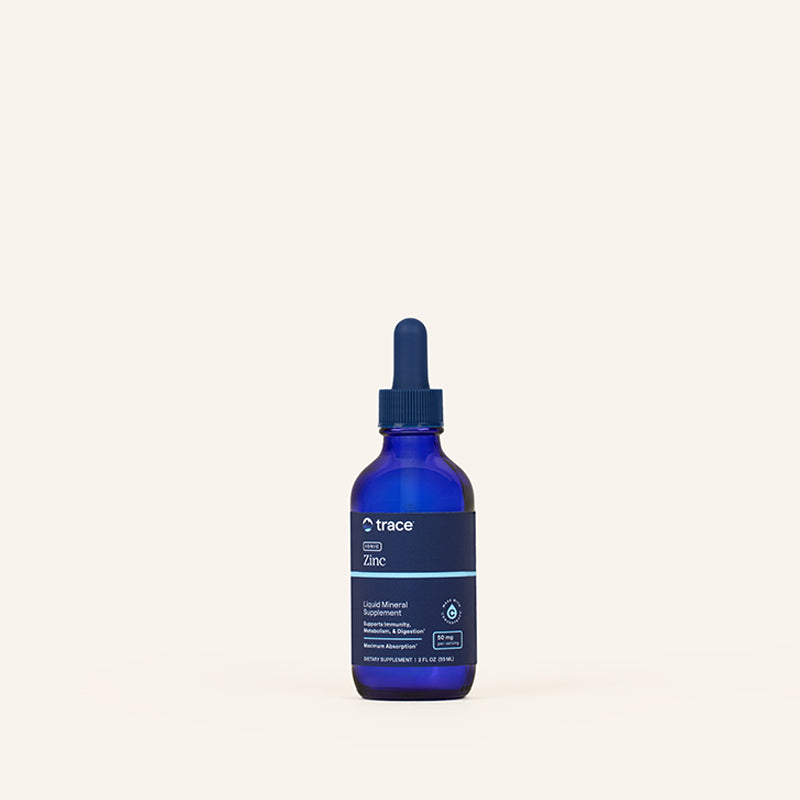Nerve Support Supplements
At Trace, we’re pioneers in mineral science with over 50 years of dedication to clean, bioavailable formulations that support your body from the inside out. Our supplements are crafted to nourish your nervous system with minerals it recognises and uses—nothing artificial, nothing wasted. Trusted by health professionals and wellness seekers alike, Trace is where integrity meets efficacy. Real results demand more than just promises; they require precision.
Filters
Filters
Understanding Nerve Health And Why It Matters
Your nervous system is the central command for everything your body does—from reflexes and movement to concentration and emotional response. It processes and sends electrical and chemical signals through an intricate network of neurons, allowing your brain, muscles, and organs to communicate. When nerve health is impaired, these signals can misfire or slow down, resulting in symptoms like tingling, numbness, muscle weakness, pain, and reduced cognitive function.
The Role Of Minerals In Nerve Function
Nerves rely on a steady supply of minerals and electrolytes that facilitate signal transmission for proper operation. Magnesium plays a vital role in calming overexcited nerve cells, helping prevent overstimulation that can lead to discomfort or dysfunction. Potassium and sodium are essential for initiating action potentials—electrical impulses that allow messages to travel between neurons. Calcium contributes to neurotransmitter release, making these minerals fundamental for nerve signaling and coordination.
How Modern Habits Can Undermine Nerve Health
Despite these nutrients' importance, many people fall short due to modern diets high in processed foods and low in mineral-rich whole ingredients. Agricultural practices that strip soil of nutrients further reduce the mineral content of our food. Over time, these deficiencies can place excessive stress on your nervous system, even if symptoms aren’t immediately obvious.
Why Supporting Nerve Health Should Be A Daily Priority
Taking steps to maintain nerve health isn’t just for those facing medical conditions—it’s essential for anyone who values mental clarity, physical performance, and long-term resilience. Whether dealing with daily stress, physical demands, or cognitive fatigue, supporting your nervous system with targeted nutrients can help you feel more balanced, focused, and energised.

Essential Minerals Added To Our Nerve Health Supplements
ConcenTrace® Daily Mineral Powder is more than just a supplement—it’s a clinically informed nerve support solution built on decades of mineral science. At Trace, we’ve carefully selected each ingredient to address the root needs of your nervous system.
Here’s why each one made it into our formula:
- Magnesium: Magnesium is critical for regulating nerve signal transmission and calming overexcited neurons. It helps prevent nerve-related issues like twitching, tingling, and hypersensitivity. We added magnesium to our supplement because it's often depleted by stress and poor diet, and replenishing it helps support relaxed, stable nerve activity.
- Sodium: Sodium drives the creation of action potentials, the electrical signals that allow nerves to communicate with muscles and the brain. Without it, the nervous system slows down. We included sodium because it helps restore proper signal transmission, especially in active individuals who lose this mineral through sweat.
- Chloride: Chloride maintains fluid balance and electrical neutrality around nerve cells, ensuring smooth communication between neurons. We chose to include chloride because it works synergistically with sodium to support steady nerve impulses and contributes to a stable cellular environment.
- Potassium: Potassium helps nerves return to their resting state after firing, which is essential for preventing overstimulation and maintaining calm, focused energy. We added potassium to the formula because it’s frequently lost in dehydrating conditions, and its replenishment is key to consistent nerve function and muscle coordination.
- Spirulina: Spirulina is a nutrient-dense algae rich in antioxidants, amino acids, and trace minerals that protect nerve cells from oxidative damage. We included spirulina because it offers a natural, plant-based source of neuroprotective compounds that enhance the resilience and longevity of your nervous system.
Each ingredient was purposefully selected to create one of the most complete supplements for nervous system on the market. It is designed to protect, balance, and strengthen your nervous system from the inside out.
How Mineral Deficiencies Impact Nerve Function
Your nervous system depends on essential minerals to transmit precise electrical signals. Magnesium, potassium, calcium, and sodium don’t just support these functions—they drive them. Each nerve impulse relies on these nutrients to regulate cellular activity, maintain signal speed, and ensure information flows reliably across the brain and body.
Magnesium’s Role In Nerve Regulation
Magnesium helps modulate calcium flow in and out of nerve cells, preventing overstimulation that can lead to discomfort. A lack of magnesium disrupts this balance, which may result in involuntary muscle twitches, cramping, or tingling sensations. It also impacts nerve recovery and resilience under stress, making daily intake crucial for long-term function.
Potassium And Sodium In Signal Transmission
The body’s ability to initiate and transmit action potentials—its core electrical signals—depends on an exact ratio of potassium and sodium. Potassium deficiency slows these signals, reducing responsiveness, general fatigue, or altered nerve sensation. Sodium helps maintain cellular fluid balance and nerve firing speed. Even slight imbalances can affect physical coordination and energy levels.
Calcium And Neurotransmitter Communication
Calcium is required for neurons to release neurotransmitters—chemical signals that drive motor control, reflexes, and mood stability. A shortfall in calcium can result in dulled sensory feedback, slower reaction times, or impaired coordination. Together, these impacts subtly degrade the body’s communication pathways.
Why Deficiencies Are Increasingly Common
Modern diets high in processed foods often lack nutrient density. Mineral depletion in agricultural soil compounded this, meaning even healthy choices may fall short. These gaps can contribute to long-term nervous system stress without intentional replenishment, undermining everything from mobility to mental focus.
Support your body’s most vital connections—starting with your nerves. At Trace Minerals, our mineral-rich nerve support supplements are formulated to promote calm, clarity, and reliable communication between mind and body. Clean, bioavailable, and rooted in decades of science, they help you stay sharp and steady. Give your nervous system what it truly needs—because balance starts at the source.
How To Choose The Right Nerve Support Supplement
Finding a nerve support supplement that works for you means cutting through marketing buzz and focusing on solid science.
Here’s what you need to look for:
- Check For Key Minerals & Vitamins: Nerve health depends on a delicate balance of essential nutrients. Evaluate formulas for proven ingredients like magnesium, vitamin B12, vitamin D, and alpha-lipoic acid. Magnesium is significant in supporting nerve transmission, while B vitamins, especially B12, are critical for nerve repair and myelin formation. Ingredients should sound impressive and have research to back up their effectiveness.
- Scrutinize Ingredient Transparency: Always read supplement labels carefully. The best nerve support supplements list all active ingredients, their precise dosages, and the forms used. Look for clinical-grade forms, like methylcobalamin for B12 or chelated magnesium, for superior absorption and bioavailability. Avoid proprietary blends that obscure actual ingredient amounts.
- Ensure Purity & Quality: Third-party testing is non-negotiable. Trust supplements that verify purity and ingredient potency through independent labs. This ensures what’s on the label is what’s in the bottle, and that it’s free from contaminants like heavy metals or artificial additives.
- Consider Your Lifestyle & Existing Nutrient Gaps: Your diet, activity level, and overall health status matter. Athletes, vegetarians, and those with certain medical conditions may need specific minerals or vitamins in greater amounts. Look for products that align with your unique lifestyle and dietary gaps so you get targeted support.
- Seek Science-Supported Formulas: Don’t just chase the latest trends—look for supplements with formulations grounded in peer-reviewed research. Reputable brands often mention the clinical evidence behind their ingredient choices, giving you confidence that what you’re taking is designed to deliver real results.
By prioritizing these factors, you can confidently navigate the supplement aisle and choose a nerve support product that’s effective, safe, and tailored to your health goals.
Lifestyle Tips For Enhancing Nerve Health
Supporting your nerve health is about creating daily habits that protect and nourish your nervous system.
Here are evidence-backed strategies you can incorporate:
- Prioritize Balanced Nutrition: Your nerves rely on a steady supply of nutrients to function at their peak. Focus on whole foods rich in B vitamins, antioxidants, and healthy fats. Foods like leafy greens, nuts, seeds, fish, and avocados deliver nutrients essential for nerve function and protection against oxidative stress.
- Move Your Body, Stimulate Your Mind: Regular exercise encourages healthy blood flow, which is critical for nerve cell nourishment. Mixing aerobic workouts with strength training and gentle practices such as yoga or stretching can improve nerve signaling and flexibility. Cognitive activities—puzzles, reading, or learning new skills—help keep the nervous system agile.
- Practice Stress Management: Chronic stress can overtax your nerves. Incorporating stress-relief techniques like meditation, deep breathing, or spending time in nature can regulate cortisol levels and support nerve resilience. The calmer your environment, the better your nerves perform.
- Optimize Sleep Quality: Sleep is a non-negotiable pillar for nerve repair and regeneration. Aim for 7–9 hours per night and stick to a consistent sleep schedule. Limit screen time before bed, keep your bedroom cool and dark, and embrace calming bedtime rituals to promote restorative rest.
- Stay Hydrated: Dehydration can hamper nerve signaling and overall function. Make water your primary beverage, and remember that electrolyte-rich fluids are vital if you’re active or live in a hot climate. Track your intake and adjust as needed to keep your system running smoothly.
- Avoid Toxins & Excessive Alcohol: Limit exposure to substances that can damage nerve tissue, such as heavy metals, pesticides, and excessive alcohol. Smoking cessation and moderating alcohol intake create a healthier environment for your nervous system to thrive.
Integrating these practices gives your nerves the foundation they need for long-term health and performance.
Read also:
- Common Signs of Mineral Deficiency & Prevention Tips | Trace Minerals
- What Type Of Magnesium Should I Take For Maximum Benefits?
- Are Trace Minerals Good For You? Health Benefits Explained
Sources:
- Kirkland, A. E., Sarlo, G. L., & Holton, K. F. (2018). The Role of Magnesium in Neurological Disorders. Nutrients, 10(6), 730. https://doi.org/10.3390/nu10060730
- Brini, M., Calì, T., Ottolini, D., & Carafoli, E. (2014). Neuronal calcium signaling: function and dysfunction. Cellular and molecular life sciences : CMLS, 71(15), 2787–2814. https://doi.org/10.1007/s00018-013-1550-7
- Brini, M., Calì, T., Ottolini, D., & Carafoli, E. (2014). Neuronal calcium signaling: function and dysfunction. Cellular and molecular life sciences : CMLS, 71(15), 2787–2814. https://doi.org/10.1007/s00018-013-1550-7
- Podgórska-Kryszczuk I. (2024). Spirulina-An Invaluable Source of Macro- and Micronutrients with Broad Biological Activity and Application Potential. Molecules (Basel, Switzerland), 29(22), 5387. https://doi.org/10.3390/molecules29225387
Frequently Asked Questions
Nerve support supplements are formulas designed to nourish and protect your nervous system. They typically include minerals like magnesium, potassium, B vitamins, and antioxidants to support nerve repair, signaling, and long-term neurological health.
While not a cure, certain minerals may help manage neuropathy-related discomfort. Our supplements target mineral deficiencies that affect nerve function, especially magnesium, to support nerve signaling and comfort as part of a holistic approach alongside professional care.
Yes, when used as directed. At Trace, we formulate with clean, research-backed ingredients and test for quality. Still, if you’re pregnant, nursing, or managing a condition, consult your healthcare provider before starting any new supplement.
Most Trace nerve supplements are intended for daily use to replenish key minerals. However, frequency may vary depending on diet, lifestyle, and health needs. Always follow the label and check with a healthcare provider for personalised guidance.
Some supplements may interact with medications like diuretics or antibiotics. Talking with your doctor before combining them is best to ensure safe, balanced support and avoid unwanted interactions.
They supply the minerals and vitamins your nerves need to function well. Magnesium supports nerve impulses, B vitamins aid in repair, and antioxidants defend against cell damage, helping restore healthy communication between your brain and body.



